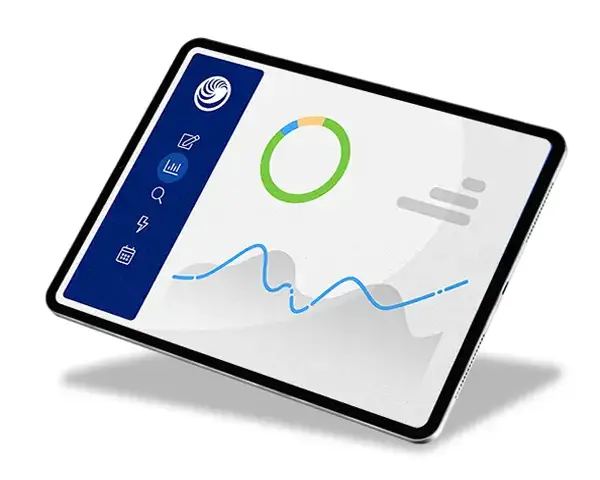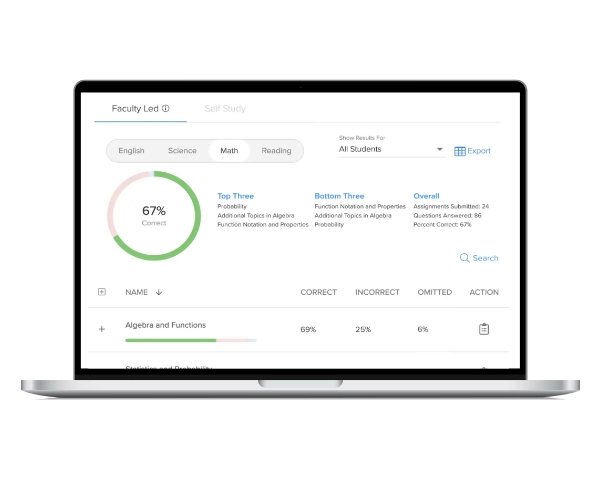With AP exams looming, the stakes are high for students and teachers. Despite diligent efforts, around 40% to 50% of students have scored a 1 or 2 on AP exams in recent years, missing out on potential college credit and scholarships.1 Consistent progress monitoring offers a solution, enabling you to identify your students' strengths and areas for growth, adjust your instruction accordingly, and build a classroom culture focused on preparation and achievement.
Custom Assessments for AP Progress Monitoring
For meaningful progress monitoring, you can design custom assessments closely aligned with course content and the exam's rigor. A balanced assessment strategy uses a mix of question types — multiple-choice for quick checks and free-response for deeper analysis and writing practice. Unit-based assessments will help you gather focused insights into your students' understanding of each unit,2 while cumulative assessments covering multiple units will reinforce and review prior knowledge.3
You can create assessments that mirror the difficulty and style of AP questions using previously released ones and adjust the difficulty level to match the diverse needs of your students. Timed assessments will give your students a taste of real exam conditions. Detailed feedback following each assessment fosters student growth and retention, while consistent check-ins allow you to accurately track progress over time.
Progress Monitoring With UWorld's Courses for AP
UWorld's Courses for AP offer you an array of tools to streamline progress monitoring, making it easier to assess your students' performance and tailor your instruction throughout the year. Here's how our specific features support effective progress monitoring:
Pre-Built Unit Assessments for Standardized Progress Checks
Our Unit Tests are standardized across courses, ensuring consistent measurement of student progress that aligns with the College Board®'s AP exam format and rigor. These assessments are especially useful for comparing performance within a class or across schools, identifying trends, and addressing knowledge gaps early. You can also use the test results as a review tool, allowing your students to revisit explanations and reinforce learning. Because the Unit Tests are updated to match course and exam changes, they provide reliable data to measure students' test readiness as they progress through the curriculum.

Check-for-Understanding Questions for Formative Insights
Each of our courses includes a series of Check-for-Understanding questions integrated within interactive study guides. These short, focused questions offer a quick way for you to gauge comprehension at the end of each unit or topic, providing formative feedback on student understanding before moving forward. You can access completion and performance data for each question set, enabling you to identify areas where your students may need further support and reinforcing concepts they might find challenging.
Customizable Assessments for Differentiated Instruction
In addition to pre-built assignments, we allow you to customize assessments using a robust question bank. You can select questions by unit, topic, or type to create assessments that align with your curriculum pacing and target specific skills or content areas. The assignment tool enables you to differentiate based on your students' unique learning needs and track their progress in specific areas of difficulty.
Data Reporting and Analytics for Informed Instruction
With our reporting dashboards, you gain access to detailed performance analytics at the student, class, campus, and district levels. These reports highlight strengths and areas needing improvement, supporting data-driven instruction. You can view breakdowns by skill or assignment, helping you adjust instruction to meet your classes' needs or focus on specific concepts. For campus testing coordinators and district administrators, this reporting allows for high-level tracking of program effectiveness and student progress, supporting goal-setting and program evaluation.
5 Tips for Effective Progress Monitoring
Effective progress monitoring doesn't have to be complex. Here are 5 actionable strategies you can implement to improve your student outcomes:
- Assign Progress Checks Regularly:
- Create Custom Skill Assessments:
- Analyze Data to Guide Instruction:
- Implement Frequent Formative Assessments:
- Simulate Exam Conditions with Practice Tests:
Use Unit-specific progress checks with multiple-choice and free-response questions to identify strengths and gaps. Encourage your students to review their results.
Build targeted quizzes with our Courses for AP and your own questions. Differentiate these quizzes by class needs and combine units for cumulative reviews.
Use assessment data to adjust pacing, form study groups, and provide targeted interventions for difficult content areas.
Use our Check-for-Understanding questions and mini-quizzes for quick comprehension checks and mastery of course topics.
Administer full-length, timed exams to mirror the AP exam format and help your students develop test-taking strategies.
Discover how UWorld's Courses for AP resources can help you track student progress and refine instruction to ensure every student has the tools they need to succeed on AP exams.

References
- College Board. (n.d.). AP score distributions. Retrieved November 5, 2024, from https://apstudents.collegeboard.org/about-ap-scores/score-distributions
- Hattie, J. A. C., & Timperley, H. (2007). The power of feedback. Review of Educational Research, 77(1), 81-112. https://pmc.ncbi.nlm.nih.gov/articles/PMC2630138/
- Sousa, D. A. (2014). Review for retention. Educational Leadership, 72(2). Retrieved from https://ascd.org/el/articles/review-for-retention




